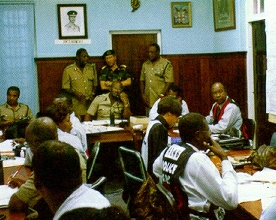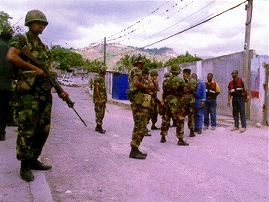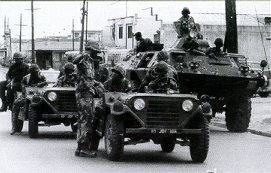|
||||||||||||||||||||||||||||||||||||
| Home > Info Centre > Publications > Alert 1998 > JDF and JCF – Together in the Fight Against Crime | ||||||||||||||||||||||||||||||||||||
|
|
The spirit of friendship and camaraderie which has blossomed between the Army and the Police owes much to the over two decades of co-operation between the two branches of the security forces in the suppression of crime in Jamaica. This successful strategy in crime control was greatly facilitated by the ready integration of the police and military working patrol zones in crime-ridden neighbourhoods. Combined security forces patrols and joint anti-crime operations have been a familiar feature of the country’s law-enforcement activities, even after the rescinding of the Suppression of Crime (Special Provisions) Act of 1974 which had authorized the "Jamaica Defence Force … to act in aid of the police". Although the Act was repealed in 1994, there remained the problem of curbing a runaway crime situation and the authorities still saw the need for the additional muscle and tactical support of the JDF to help keep the lid on crime. This support has been necessary particularly in the volatile inner city of Kingston, where gang warfare, feuding factions, the fight over drug turf, and fallout among gangsters, periodically threaten to transform these depressed neighbourhoods into virtual killing fields. Maintaining a 24 hour foot and mobile presence in these troubled communities, the police and the army have curtailed much of the lawlessness in these zones of conflict, bringing some respite to the tension.
Routine joint patrols and operations have from time to time, given way to specific strategic deployments of police/military personnel. These have come about as a response to special situations, such as the violent election campaign of 1979-80 (when the island experienced its highest murder rate of over 800 persons) to periodic escalation in gun-crimes and gang activities, that raise concerns of social stability. These specific deployments can be traced back to the election year of 1980 and are identifiable by a variety of operational code-names such as "Curtail" "Ardent," "Justice" and the most recent "Dovetail". The excellent working relationship that the two arms of national security now enjoy, did not characterize relations between the twin forces of law and order in the mid to late 1960s. In that time, there was marked animosity between the soldiers and the police, which, on occasions, escalated into fist-fights and other physical confrontations. Looking back at that long-gone and forgotten era, a senior commissioned officer of the JDF saw the friction then as nothing more deep-seated than "professional jealousy" Now fighting shoulder to shoulder to keep the peace, the soldiers, like their police counterparts, have paid the supreme price on the battle field of crime. Most noteworthy among the military casualties of criminal assault are Privates Manville Williams and Lloyd Savage, who were posthumously awarded the Medal of Honour for Gallantry in the 1981 National Honours and Awards. The two soldiers were cut down by the bullets of terrorist gunmen in incidents during the violent election campaign of 1980. Pvt Williams was slain on the night of October 23 in a clash between a small police/military patrol and a terrorist gang in Denham Town, West Kingston. The other members of the tiny joint patrol, then Constable Michael Harriott of the JCF and Corporal Michael Muir of the JDF, who fought their way out of the cordon of death to the safety of the Denham Town Police Station, were also recipients of the Medal of Honour for Gallantry. Pvt Savage was killed by gunmen in Tower Hill, St. Andrew in November 1980.
Formed out of the old West India Regiment, the JDF was among the first national institutions whose establishment coincided with the country’s independence on August 6, 1962. The constabulary boasts a longer lineage, having its official beginning as the Jamaica Constabulary Force in 1867. The existing police force then, was reorganized and central control established to correct deficiencies observed in the response of the police to what has now come to be known as the Morant Bay Rebellion, two years earlier. The recent scaling down of the Army’s participation in the day to day counter-crime activities, marks the end of an era of police/ military routine co-operation in crime control. Joint JDF/JCF deployments from the famous Lathbury Barracks of Up Park Camp (named in honour of the last British commander of the West India Regiment, General Sir Gerald Lathbury) may have now ceased on a routine basis. The mutual friendship, trust and respect which have been forged between the Army and the Police are deep and abiding, and will serve the nation in good stead whenever the forces of law and order need to rally, to bring criminals to justice.
|
|||||||||||||||||||||||||||||||||||
|
|
||||||||||||||||||||||||||||||||||||



